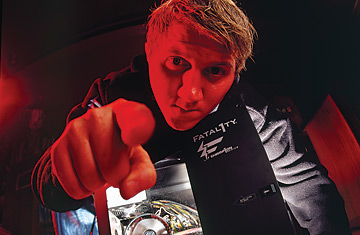
Professional video gamer Johnathan Wendel in his house in Kansas City, Kan.
(2 of 2)
MLG specialized first in platform gaming exclusively, holding contests and establishing official rankings. In addition to being shown on USA, MLG matches are televised on Comcast's on-demand service as well as on the MLG website. But more important, MLG landed some big corporate fish as sponsors, including Boost Mobile, Toyota and Gamestop. That made the prize pool big enough to allow many gamers to quit their day job.
Dave (Walshy) Walsh was working 65 hours a week at the post office when he began gaming. For his first tournament, in the summer of 2003, he drove to Nashville, Tenn., and crammed into a hotel room with six others. He took fifth place and won 50 bucks playing the original Halo. But by 2004 he was pulling down $1,100 per competition. In 2005 he won a new car worth $43,000, which he sold to make a down payment on a house and launch a fledgling clothing line aimed at gamers called Kiaeneto.
Walsh began selling Kiaeneto T shirts over the Internet and at gaming centers where devotees gather to play. He says in the first month he sold more than $15,000 in shirts and hopes over the next few years to build a line exclusively for gamers. "I would go to a lot of these competitions, and I'd see people wearing Hurley or Volcom," says Walsh. "But those labels are for skaters and snowboarders. There are a lot of people out there who want to represent video gaming."
In a world full of geeky male teens, a promoter's dream might be a team of Swedish women. And there is. Les Seules, a Swedish squad founded in 2004 for a French competition, is one of dozens of female teams formed over the past three years. Captain Louise (AurorA) Thomsen says that when she started playing Counter Strike in 2003, there were about 10 teams; now there are more than 100. She says advances in design have broadened gaming's appeal, particularly in Scandinavia, where gamers abound. (And with up to 20 hours of darkness each day in winter, there's a certain logic to that.)
Les Seules anticipates a new slate of sponsors on the heels of a world tour filmed for an upcoming reality-TV series that has been sold to numerous networks around the world. The team is already sponsored by headphone manufacturer Sennheiser, which pays the women to wear the headphones in competition, to listen in on the sounds of digital slaughter.
Last year MLG focused on four-vs.-four team matches for the game Halo 2. Rob Dustin, an executive producer at MLG, says the main challenge was whittling down the onslaught of information for the lay viewer. Next season Dustin hopes to find a Cinderella team and build its programming around it. He needs more stars. "The uniqueness of the MLG is that you can start as just four guys from Poughkeepsie and end as a top-five team," says Dustin. "You can't do that in other sports."
It's a lesson that Wendel has fully absorbed. At the recent Consumer Electronics Show in Las Vegas, he strutted onto a stage and faced all comers in the first-person shooter Quake 4. The first challenger lost, 23 to 0. Another scored -3. None of the 20-odd opponents scored a point. Afterward, Wendel talked up a new deal he had signed for the Championship Gaming Series. Instead of playing, Wendel will be announcing for DirecTV's new series. "I'm going to be the John Madden of gaming," says Wendel/Fatal1ty. That's when he's not being the Michael Jordan of gaming.
